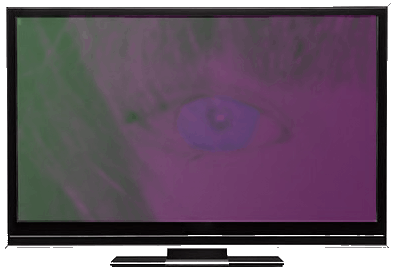An Uninvited Guest In Your Living Room...
 ...Is 2014 the year when we will see the death of the remote control and the introduction of 24hr monitoring inside every living room?
...Is 2014 the year when we will see the death of the remote control and the introduction of 24hr monitoring inside every living room?
For many years TV manufacturers have made the bulk of their profits from the selling of increasingly minimised hardware at reasonable profits. This has been supported by innovations such as increasingly larger screens followed by LCD,LED,HD,3D and 4K providing yet another “next new thing” to allow them to sell a combination as yet another new TV to those who always want the latest available technology. This has provided substantial profits to the likes of Samsung, Panasonic and Toshiba and other hardware manufacturers over the years.
More recently, the introduction of so called ‘Smart TVs’ has provided a new income stream as TV manufacturers have been able to provide their own ‘App stores’ to provide built in software applications to provide additional functionality to users such as Skype or Netflix integrations.
This has only generated a modest amount of revenue though and is likely still generating more cost in terms of research and development at this time leading to a net loss.
Both of these areas could soon be overshadowed however by a significant upcoming change in the role that TVs will play in how we interact with the services available…
A rising number of TVs now ship with built in cameras to allow video calls to be seamlessly integrated and to enable gesture controls. This same functionality has been proven to allow the possibility of tracking eye movements and facial expressions. Extend this one small step further and with a Kinect style ability to recognise individuals there is suddenly a huge new market emerging for TV manufacturers to take advantage of.
Relevant content
Why would an advertiser want to show their advert while their target audience is not watching? Why would a teenager watching the TV want to see an
advert for "shiny, clean dentures"? Similarly, your 100 year old relative is unlikely to want to take up skateboarding. This is wasted advertising money… Instead, if they know that certain people are watching, then they might want to instead show some relevant content for them or place their advert elsewhere.
If facial expressions and eye movement can be tracked using the built in camera, then advertisers can suddenly learn what impact the wording of their adverts has upon specific users and tailor audio tracks to get their attention. Perhaps “Best pizza in the whole of Manchester!” did not make you look up from your smartphone, but “Best Hot Pepperoni Pizza at your door in 30 seconds!” may have you looking up and/or licking your lips…
Can you imagine how powerful this could be for the multi-billion pound advertising industry? The humble TV suddenly becomes a tool to target viewers on the basis of who is in the room with different adverts shown to Peter or Paul based on their personal, perhaps even sub-conscious preferences.
With the significant income that TV manufacturers could generate from advertisers to have access to this immensely valuable metadata, it is likely that they would want all of their new TVs to feature built in cameras. It is also possible that the costs of new TVs in future would be much lower as they do not need lots of new technology to support this technique as it is mostly down to video analysis of the scene caught by a built in camera.
Privacy Expectations
If users suddenly begin to understand though, that they have become mere products in this supply chain, then it would be only natural for those who want to protect their privacy to want to cover up cameras so as to maintain their own comfort level of sharing information.
This of course would stop the TV manufacturers in their tracks and suddenly remove the input of all of the potentially much more lucrative reaction data. This is especially the case if they subsidise the cost of new sets by using the sold data to offset the manufacturing costs.
So how do you prevent people from covering up the cameras? This tricky issue is perhaps easily resolved by adding a new ‘feature’ by the way of gesture controlled televisions where no remote control is available or indeed possible. If you take the remote control out of the equation then the only way to adjust the volume or change the channel will be to leave the camera uncovered to allow gesture recognition.
Just before UK readers shout: “Hah! I will just use my Sky box controller or Virgin remote” or American readers grab their TiVo remotes, I would urge you to consider that these set top box providers are probably looking at the exact same market space also at the moment, for the very same reasons.
It would be interesting to hear the UK Information Commissioners take on this potential development and the impact that it might have regarding privacy versus profit.
So to summarise, what does this mean in practical terms as the next few years unfold?
- Gesture controls will be advertised as a feature
- TV Remote controls will no longer be provided
- Cameras will be a standard feature at increasing resolutions
- Set top box providers and TV manufacturers will compete for market share
- Viewers will be at risk of living in a viewing ‘bubble’ without diversity
- Blocking the camera will be rendered impractical / inefficient
- TVs will be cheaper
- You will become the product
- Shares in TV manufacturers may be a good purchase decision in 2014
- Adverts may become dynamic and hosted by TV manufacturers as a service
- Advertisement funded TV content providers may feel impact (Think ITV...)
- Service provision may be funded by access to camera output
- Smart TVs already pose a data security risk - Mandatory cameras extend this
References:
Ongoing - Smart TVs on Wikipedia
28/10/13 - Getting Smart on Smart TVs: Awareness Increases Likelihood of Consumer Purchasing, Survey Shows
04/09/13 - Smart TV interactive ad formats increase brand engagement
20/12/13 - Media Devices Hit 140 Million, Smart TVs Push Increase
18/08/13 - Google patents 'pay-per-gaze' eye-tracking that could measure emotional response to real-world ads
08/05/13 - Eye-Tracking Technologies Are About To Make Advertising Even More Invasive


0 Comments
Recommended Comments
There are no comments to display.